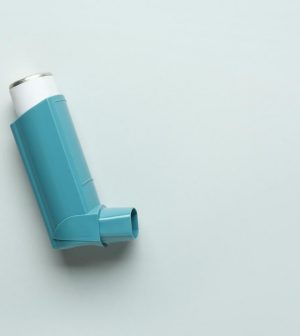- Could Your Grocery Store Meat Be Causing Recurring UTIs?
- Are You Making This Expensive Thermostat Error This Winter?
- Recognizing the Signs of Hypothyroidism
- 10 Strategies to Overcome Insomnia
- Could Artificial Sweeteners Be Aging the Brain Faster?
- Techniques for Soothing Your Nervous System
- Does the Water in Your House Smell Funny? Here’s Why
- Can a Daily Dose of Apple Cider Vinegar Actually Aid Weight Loss?
- 6 Health Beverages That Can Actually Spike Your Blood Sugar
- Treatment Options for Social Anxiety Disorder
Late-Life Menopause Linked to Higher Asthma Risk

Women who enter menopause at a later age have a greater risk of asthma, a new study says.
Meanwhile, early menopause is associated with a reduced risk of developing asthma, researchers found.
The results run counter to other studies suggesting that early menopause, defined as ages 40 to 44, is more detrimental to a woman’s health, increasing her risk of heart disease, diabetes, osteoporosis and depression, the researchers noted.
They also provide additional evidence for a link between female hormones and asthma, the team led by Durmalouk Kesibi, from York University in Toronto, found.
Childhood asthma is more prevalent in boys than girls, but adult-onset asthma is more common in women than men. Women also tend to have more severe asthma, and they are less likely to have their asthma go into remission, researchers noted.
“This study highlights sex-based differences in asthma, with women at a greater risk for asthma than men in adulthood,” said Dr. Stephanie Faubion, medical director for The Menopause Society.
“It also showed that women with later onset of menopause are at greater risk than those with early onset of menopause,” Faubion added in a society news release. “Clinicians should be aware of this link and should monitor women with later age at natural menopause for asthma symptoms.”
For this study, researchers reviewed data on more than 14,000 postmenopausal women with 10 years of follow-up.
Both natural estrogen and synthetic estrogen increase risk of asthma, researchers noted.
Women using hormone therapy have a 63% increased risk of asthma, while women who stop hormone therapy are twice as likely to quit asthma treatment, researchers said.
Higher BMI is also an asthma risk factor for women, because fat produces estrogen, researchers said.
The new study was published Oct. 30 in the journal Menopause.
More information
The Office on Women’s Health has more on women and asthma.
SOURCE: The Menopause Society, news release, Oct. 30, 2024
Source: HealthDay
Copyright © 2026 HealthDay. All rights reserved.










